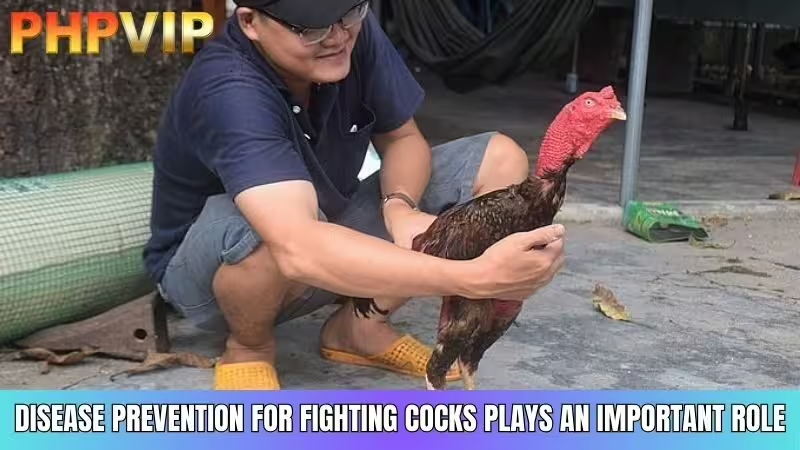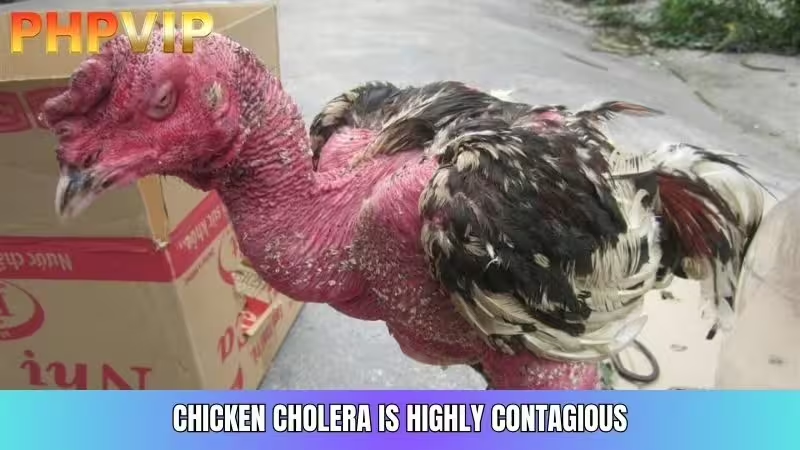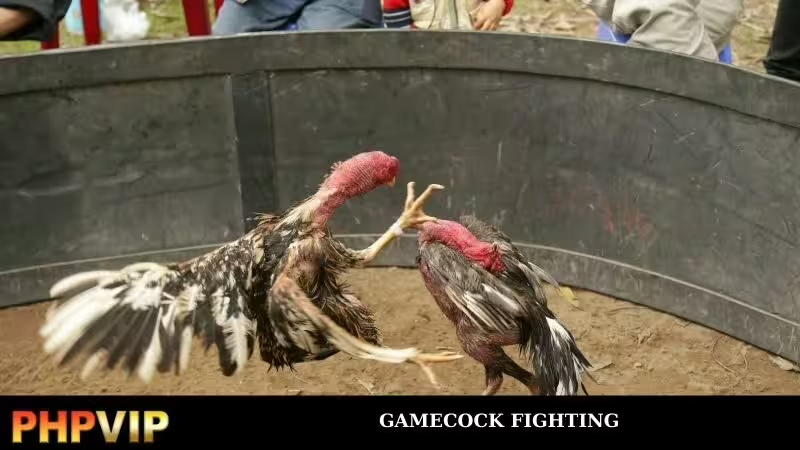Preventing diseases in gamecocks is crucial for breeders, especially in humid weather and high temperatures. These diseases not only weaken their health but also affect the fighting skills of the roosters. In this article, PHPVIP will guide you through the best techniques for caring for and preventing diseases in gamecocks.
The Importance of Preventing Diseases in Gamecocks
Taking care of and preventing diseases in gamecocks is vital and always a priority for breeders. Here are several reasons why you must know how to keep your fighting rooster disease-free:

- It helps prevent infectious diseases from spreading among the roosters and boosts the immune system of the entire flock.
- Preventing diseases ensures the rooster maintains good health and optimal physical development.
- It ensures that the rooster’s fighting skills and performance are not affected.
Common Diseases in Gamecocks
Infectious diseases not only weaken the health of gamecocks but also easily spread to other birds in the flock. It’s important to recognize the symptoms of common diseases and know how to treat them. Below are some of the most frequently encountered diseases in gamecocks and their treatments.
Fowl Cholera (Pasteurellosis)
This is one of the most common and dangerous diseases in gamecocks, caused by the Gram-negative bacteria Pasteurella Multocida.
When infected with fowl cholera, gamecocks show the following symptoms:
- High fever up to 43°C, loss of appetite, or eating less than usual.
- Lethargy, fatigue, and a pale, bluish comb.
- In severe cases, mucus may flow from the mouth, possibly mixed with blood.
- Continuous diarrhea, initially white, milky stools, later turning green with mucus.
Fowl cholera progresses quickly, so it’s important to know how to prevent diseases in gamecocks. To treat it, isolate healthy birds and administer Fluquin Wsp Pro, Fendox Plus, Flodoxy Oral, Maxflo Oral Gold, and Cepti 55s.
Bronchitis
Bronchitis is caused by the Coronavirus, spread through the respiratory and digestive systems or by simply sharing the same air. It can also spread via vehicles, dogs, humans, and rats carrying the virus from other locations.
Symptoms of bronchitis include loss of appetite, rough feathers, wheezing, and the rooster often resting near a heat source. The incubation period is short, typically 18 to 36 hours.
Newcastle Disease (Fowl Pox)
Newcastle Disease, also known as Fowl Plague, has an incubation period of about one week. It spreads through the respiratory and digestive systems and can also be carried by wind from other infected areas.

Infected roosters may experience a rapid decline in health and die gradually. Early signs include loss of appetite, difficulty breathing, ruffled feathers, a pale comb, swollen face, and watery diarrhea.
Currently, there is no specific treatment for Newcastle Disease, so prevention is key. Regular cleaning of the coop using biological products and preventing potential carriers of the disease are essential measures.
Fowl Pox
This disease, caused by Poxvirus, leads to slow growth in gamecocks, with inflammation occurring in various skin areas. You may notice bumps appearing around hair follicles, the eye rim, and the beak.
The mortality rate from fowl pox is about 5–12%. If an outbreak occurs, infected roosters should be destroyed to prevent the spread to other birds. The only prevention method for fowl pox is vaccination.
Marek’s Disease
Marek’s Disease is a dangerous viral infection that can be fatal if not properly managed. If you don’t know how to prevent diseases in gamecocks, the risk of rapid death is high.
Typical symptoms of Marek’s Disease include leg paralysis, loss of coordination, and the appearance of tumors. This disease progresses quickly, so it’s crucial to monitor your birds closely for timely treatment.
- Top 5+ Best Supplements for Fighting Cocks in 2025
- Gamecock Fighting: Big Wins with a Trusted Platform in 2025
4 Essential Ways to Prevent Diseases in Gamecocks
Proper care and disease prevention for gamecocks involve various aspects. Here are some basic care tips shared by experts that you can follow to keep your fighting rooster healthy.
Build a Proper Diet Plan
A balanced diet not only helps the gamecock grow well but also boosts its immunity. The foods you should provide include:

- Protein-rich foods: Soybeans, fish, flour, and insects help develop muscles and support egg production.
- Vitamins and minerals: Essential nutrients like calcium, magnesium, and vitamins D, E, and A found in vegetables help maintain the rooster’s health.
Keep the Living Space Clean
Many gamecocks get infected due to polluted and damp living environments. One of the best ways to prevent diseases in gamecocks is to maintain a clean living space.
You need to clean the coop and food containers daily to prevent the growth of parasites. Additionally, ensure the rooster has sufficient light to feel more comfortable.
Vaccinate According to Schedule
When raising gamecocks, it’s essential to follow a full and scientific vaccination schedule to prevent diseases. Experts will guide you on the necessary vaccinations and boosters required at certain intervals.

Along with vaccinations, controlling parasites is also a vital part of disease prevention. There are two ways to do this:
- Use natural or chemical antiparasitic drugs. However, avoid overuse as it may cause side effects on the flock.
- Spread lime powder to create a dry environment, preventing the growth of harmful parasites.
Regular Health Check-ups
Regular health checks are essential to ensure your fighting rooster stays healthy. These check-ups will help detect any health issues early on.
If there are any unusual symptoms, a veterinarian can monitor and provide an appropriate treatment plan. Additionally, you should keep a record of the care process to track whether the gamecock is developing well.
Conclusion
Preventing diseases in gamecocks is an important responsibility for breeders. Through this PHPVIP article, we hope you have gained enough knowledge to effectively prevent the risk of diseases. Stay tuned for more informative articles on the website to learn more about interesting breeding experiences.
 Cận Cảnh Hậu Trường Phim Nóng Dâm Dục Hơn Cả Khi Xem
Cận Cảnh Hậu Trường Phim Nóng Dâm Dục Hơn Cả Khi Xem Top 5+ Best Supplements for Fighting Cocks in 2025
Top 5+ Best Supplements for Fighting Cocks in 2025 Gamecock Fighting: Big Wins with a Trusted Platform in 2025
Gamecock Fighting: Big Wins with a Trusted Platform in 2025 Introducing DS88 Cockfighting Betting Hall on PHPVIP Bookmaker
Introducing DS88 Cockfighting Betting Hall on PHPVIP Bookmaker FC Gaming – Star Hunting, and Top Festivals on PHPVIP!
FC Gaming – Star Hunting, and Top Festivals on PHPVIP! Gamecock Fighting – Top 5 bookies bettors must try
Gamecock Fighting – Top 5 bookies bettors must try